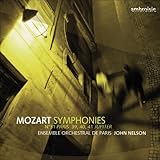Conductor John Nelson on his new Mozart Symphonies recording
 “There is simply no greater joy or challenge for a musician than to play Mozart, be it his operas, his chamber music, his religious works, or his symphonies. There is a mixture of simplicity and complexity, earthiness and transcendence, humor and gravity that no other composer surpasses. One immediately feels the joy and the challenge in rehearsal. When Mozart is programmed, every musician is fulfilled.
“There is simply no greater joy or challenge for a musician than to play Mozart, be it his operas, his chamber music, his religious works, or his symphonies. There is a mixture of simplicity and complexity, earthiness and transcendence, humor and gravity that no other composer surpasses. One immediately feels the joy and the challenge in rehearsal. When Mozart is programmed, every musician is fulfilled.
“One of the main reasons I accepted the leadership of the Ensemble orchestral de Paris was to concentrate for a period in my musical life on Mozart and his contemporaries. During the last several decades, this repertoire has gradually moved from the established orchestras to period instrument groups and I have found myself less and less satisfied with the decreased rehearsal time and stylish practice offered by the large orchestras in this music. So it has been a great joy to immerse myself for ten years in Mozart, Haydn, and Beethoven with my wonderful colleagues in the Ensemble orchestral de Paris.
“When a decision was needed for what to do for our last recording and final concert together, there was no question in my mind but to program the pinnacle of the repertoire written for our size ensemble – the last three symphonies of Mozart. No matter how well known, no matter how many times we have performed them, these three pose enormous interpretive challenges: how to find a true Mozart style that has been clouded by years of bad practice, how to find proper tempi such as in the first moment of the 40th with its markings of Alla breve and Molto allegro, how to make the supreme complexities of the final fugal passage in the 41st sound natural and clean, and, above all, to let Mozart’s vivacious personality speak freely.
“Whatever the result, we have experienced great joy in taking on the challenge. As a bonus, we offer the charming Symphony No. 31, which we feel is our property since it was written for our city. Enjoy!”
Mozart: Symphonies Nos. 31 “Paris”, 39, 40, and 41 “Jupiter”
Ensemble Orchestral de Paris / John Nelson

Comments